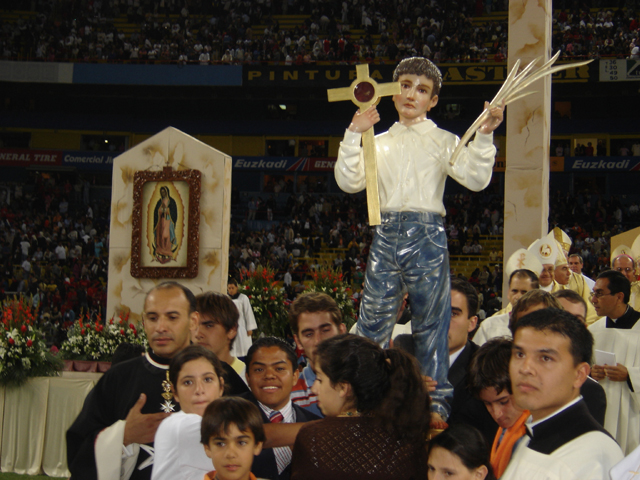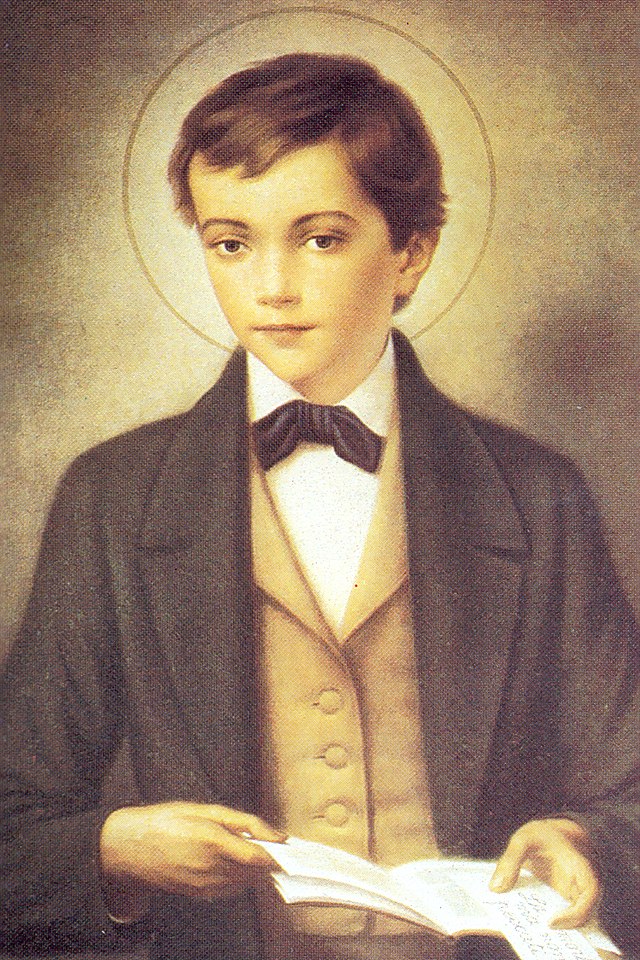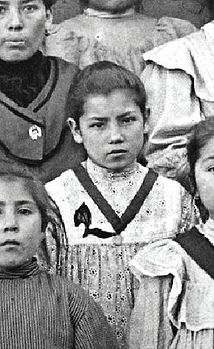Since we are travellers and pilgrims in the world, let us ever ponder on the end of the road, that is of our life, for the end of our roadway is our home (St Columban, 8th sermon).
04 June 2012
'Don't come home before midnight!' - a dying girl's gift to her parents
21 May 2012
Church honours Mexican martyrs today
Many Mexicans are suffering from a different kind of persecution today, that conducted by drug lords. Perhaps we can pray to the saints the Church honours today so that Blessed Pope John Paul's words will be fulfilled.
31 January 2012
'I have always laboured lovingly for them. . .' St John Bosco
First of all, if we wish to appear concerned about the true happiness of our foster children and if we would move them to fulfil their duties, you must never forget that you are taking the place of the parents of these beloved young people. I have always laboured lovingly for them, and carried out my priestly duties with zeal. And the whole Salesian society has done this with me.
My sons, in my long experience very often I had to be convinced of this great truth. It is easier to become angry than to restrain oneself, and to threaten a boy than to persuade him. Yes, indeed, it is more fitting to be persistent in punishing our own impatience and pride than to correct the boys. We must be firm but kind, and be patient with them. [So often I've seen young persons respond positively and with gratitude to kind firmness, what may be called at times 'tough love'.]
I give you as a model the charity of Paul which he showed to his new converts. They often reduced him to tears and entreaties when he found them lacking docility and even opposing his loving efforts. [No young person has ever reduced me to tears by his or her behaviour but I have been close to tears on occasion when a young person has thanked me for being firm and showing care.]
See that no one finds you motivated by impetuosity or wilfulness. It is difficult to keep calm when administering punishment, but this must be done if we are to keep ourselves from showing off our authority or spilling out our anger. [This echoes last Sunday's gospel, Mark 1:21-28, where the people recognised the inner authority of Jesus.]
Let us regard those boys over whom we have some authority as our own sons. Let us place ourselves in their service. Let us be ashamed to assume an attitude of superiority. [The Handbook of the Legion of Mary, written by its founder, the Venerable Frank Duff, urges a similar approach to persons.] Let us not rule over them except for the purpose of serving them better. [Elected officials and anyone in a position of authority might take this to heart.]
This was the method that Jesus used with the apostles. He put up with their ignorance and roughness and even their infidelity. He treated sinners with a kindness and affection that caused some to be shocked, others to be scandalised, and still others to hope for God’s mercy. [Read an extraordinary instance of this in yesterday's post in Remembering Fr William Doyle SJ.] And so he bade us to be gentle and humble of heart.
They are our sons, and so in correcting their mistakes we must lay aside all anger and restrain it so firmly that it is extinguished entirely.
There must be no hostility in our minds, no contempt in our eyes, no insult on our lips. We must use mercy for the present and have hope for the future, as is fitting for true fathers who are eager for real correction and improvement.
In serious matters it is better to beg God humbly than to send forth a flood of words that will only offend the listeners and have no effect on those who are guilty.
05 May 2010
'Live, don't just get by': Pope Benedict to young people in Turin
The Vatican Information Service carried the report below last Monday, 3 May. I have highlighted some parts of it and [made some comments].
VATICAN CITY, 2 MAY 2010 (VIS) - At 4.30 p.m. today, the Pope returned to Piazza San Carlo where he met with young people from the archdiocese of Turin and surrounding dioceses. Following a welcome speech by Cardinal Severino Poletto, archbishop of Turin , and a greeting from the young people, the Pope delivered his address.
Recalling how twenty-five years ago John Paul II wrote a Letter for young people focusing on Jesus' meeting with the rich young man who asked Him what me had to do to gain eternal life, Benedict XVI said: "Today it is not easy to talk about eternal life and things everlasting because the mentality of our time tells us that nothing definitive exists; everything changes, and changes quickly. In many cases, 'change' has become a watchword, ... and in this way you young people are also led to think that it is impossible to make definitive choices that commit you for life". [Many couples prefer to live together, for example, than to make the life-long commitment that marriage involves. This attitude became very prevalent in the Western world in the late 1960s and affected the Church greatly, with priests and religious leaving in huge numbers.]
However, the Pope asked, "is it true that in order to be happy we have to make do with small and fleeting moments of joy, the which, once over, leave bitterness in our hearts? Dear young people, this is not true freedom, happiness cannot be attained in this way. Each of us was created to make, not provisional and reversible choices, but definitive and irrevocable choices which give full meaning to existence. [We won't experience the truth of this until we make such choices.] We see this in our own lives: we would like every beautiful experience which fills us with joy never to end. God created us with a view to the 'forever'. In each of our hearts He placed the seed for a life that creates something great and beautiful". [Pope Benedict never short-changes us by proposing the trivial or the transitory as the goal of life.]
"In his dialogue with the rich young man, Jesus indicated life's greatest wealth: love. To love God and others with all of ourselves. ... For humans, who are mortal and limited beings, nothing is greater than participating in God's life of love. [Note: 'participating in God's life of love'. What could be greater than this?] Today we live in a cultural context that does not favour profound and disinterested human relationships, on the contrary, it often leads us to close in on ourselves, inducing individualism. ... But the hearts of the young are by nature sensitive to true love. Thus, with great trust, ['with great trust' - Benedict, the Holy Father, calls forth what is best in those who are young] I address myself to each of you and say: it is not easy to make something great and beautiful of your lives, it is demanding, but with Christ everything is possible".
"Experience this meeting with Christ's love in a strong personal relationship with Him; experience this in the Church and primarily in the Sacraments", Benedict XVI exhorted the young people. [One of the recurring themes in Pope Benedict's teaching is this strong personal relationship with Jesus Christ. Don't be led astray by 'Born Again' people who tell you that Catholics don't have that. The Pope tells us how to nourish that - through the sacraments.] "Christ's love for the young man of the Gospel is the same as that He has for each of you. It is not a love confined to the past, it is not an illusion, it is not reserved for the few. ... May each of you feel yourselves to be a 'living part' of the Church, unafraid, involved in the work of evangelisation ... [everyone is called to be a saint, a central teaching of Vatican II] with your brothers and sisters in the faith, and in communion with pastors, avoiding individualist tendencies even in the life of faith, [each is unique but God does not call us to be 'loners'] in order deeply to absorb the beauty of being part of the great mosaic that is the Church of Christ".
"May the Holy Shroud", he concluded, "be an invitation for you to inscribe the face of God's love into your hearts, in order to become, in your own lives and among your peers, a credible expression of the face of Christ".
A quote from Blessed Piergiorgio, who was on of the patrons of World Youth Day in Sydney in 2008, that reflects what the Holy Father said on Sunday in Turin: 'To live without faith, without a patrimony to defend, without a steady struggle for truth, that is not living, but merely existing; we must never just "exist".'
04 March 2010
A prince known for his sense of justice and for his purity
- He dedicated himself completely and entirely to Christ's poor, to the pilgrims, the sick, the prisoners,and to all in distress.
- To widows, orphans and the oppressed, he was not only a protector and defender, but a father, son and brother.
- Nor is it possible to tell or even imagine the extent to which he promoted justice and exercised temperance, or the prudence with which he was endowed, or the strength and constancy of is character, and that in an age of permissiveness, when men were very much inclined to fall into evil ways . . .
- Day by day her urged his father to rule the kingdom and the subject peoples with justice . . .
- He took up the causes of the poor and wretched, and followed them up as if they were his own. Because of this the people called him the defender of the poor . . .
- It was always his preference to mix with the poor and the weak . . .
- He never sought the power which belongs to men of the highest rank . . .
- We have the word of important and trustworthy men, who were close to him and in whom he confided, that he lived as a virgin all his life, and died a virgin.
One of the things that happened during Martial Law was the forced sterilisation of many women after they gave birth in government hospitals. The Population Commission at the time was pushing a very aggressive population control programme at the time. It was widely believed that each government hospital had a quota of sterilisations that they were expected to meet. Husbands weren't consulted and wives often made decisions that they later regretted because they were under pressure from those who should have been taking care of them.
On the other hand, government doctors and nurses are poorly paid. Today, many fully qualified nurses who cannot afford to go overseas where they will get jobs with decent pay, often have to offer their services as 'volunteers' in government hospitals.
There is no question that many Filipinos have a strong Catholic faith. Many died during the Martial Law years in witness to that. But there is a woeful absence of a sense of the justice the Gospel demands, especially when it concerns the poor and the good of the wider community, as shown in the Human Face column of Ma. Ceres P Doyo (photo) in today's Philippine Daily Inquirer, Confessions of a highwayman. You can also find the article on Ceres' own blog, Human Face by Ceres. Ceres is one of the best journalists in the Philippines.
20 December 2009
A saint-in-the-making who failed in mathematics
For two or three years I've been intending to write an article for Misyon, which I edit on behalf of the Columbans in the Philippines, about a young Italian woman who died just short of her 19th birthday in 1990. Her name was Chiara 'Luce' Badano. Recently I asked someone else to use the material I had gathered to write the article. One of the things that had attracted me was that Chiara failed mathematics in high school. Though I had no difficulty with mathematics until my last two years in school I never liked the subject and sympathise with those who finds it difficult. The terms 'trigonometry' and 'applied mathematics' are simply words to me now. I have a vague recollection of trigonometry being a cross between algebra and geometry. One of the happiest moments in my life was when I finished my exams in mathematics and science in my Leaving Certificate in Ireland in 1961. I have never opened a book in either subject since.
I have a young friend in first year high school here in Bacolod who is struggling with mathematics (in Ireland we shorten that to 'maths' but here in the Philippines it's 'math') and when we meet I usually ask her 'How is "Mattie"?' (At the moment 'Mattie' is not too well!)
I really will have to make sure the article is written very soon for Misyon because yesterday Pope Benedict gave the 'green light' for Chiara to be beatified. The Pope also declared both Pope Pius XII and Pope John Paul II as 'Venerable', meaning that they may be venerated. The next step, if a miracle through their intercession is officially declared by the Church, then they may be beatified.
Chiara was a member of Focolare, whose foundress, Chiara Lubich, who died earlier this year, gave her the name 'Luce', the Italian for 'light'. 'Chiara' is the Italian form of 'Claire'.
Chiara was her parents' only child and she arrived more than 11 years after they were married. Coincidentally, the Vatican announcement was made yesterday when the readings at Mass dealt with that very same theme - childless parents who longed for a son or daughter. God heard the prayers of Manoah and his wife and gifted them with a son named Samson. God equally heard the prayers of St Elizabeth and her husband Zechariah. The son of their old age was St John the Baptist.
Chiara's mother is quoted as saying after her birth, 'Even though we were so immensely happy, we understood straightaway that this child wasn’t ours alone. She belonged to God first of all.'
Though the commentary in the video above is in Italian you can see many photos of Chiara.
You can read more about Chiara here.
This video features a song in Chiara's honour, also in Italian, with the words on the screen.

















